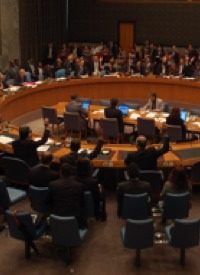
By issuing Executive Order 13466, the statement said, the president "declared a national emergency pursuant to the International Emergency Economic Powers Act … to deal with the unusual and extraordinary threat to the national security and foreign policy of the United States constituted by the current existence and risk of the proliferation of weapons-usable fissile material on the Korean Peninsula."
Obama’s action continues restrictions on property dealings ordered by former president Bush. At the same time Bush issued those sanctions, however, he removed North Korea from the U.S. list of state sponsors of terrorism and from the Trading with the Enemy Act, in accord with an agreement reached earlier with North Korea in the nuclear forum that includes South Korea, China, Japan, and Russia.
An AFP news report of June 24 commented on the background behind these latest actions:
Bush at the time [of issuing last year’s sanctions order] was racing to clinch a denuclearization deal with North Korea late in his term. He also took Pyongyang off a list of state sponsors of terrorism, to the dismay of Japan and some US conservatives.
Diplomacy with North Korea has since quickly deteriorated, with the hardline state in recent months testing a nuclear bomb, firing missiles and bolting from a six-nation agreement that set a framework for denuclearization.
In a report on this latest presidential order, a Reuters news writer made a logical connection between the president’s executive order and the recent UN Security Council’s resolution to tighten sanctions on North Korea, following up a quote from the Obama order with this observation:
The expanded U.N. sanctions ban all weapons exports from North Korea and most arms imports. U.N. member states are also authorized to inspect North Korean sea, air and land cargo and destroy any goods that violate the sanctions.
Obama has said the U.S. military is prepared for the possibility that North Korea may attempt to launch a missile toward Hawaii in response to the new U.N. sanctions.
Though the presidential order did not mention the UN sanctions, a report ("A Unanimous Vote on North Korea") on the Security Council’s June 12 passage of U.N. Resolution 1874 posted on the White House website states in unequivocal terms that our government is committed to enforcing the UN action. The report cites United States Ambassador Rosemary DiCarlo’s remarks following the vote on Resolution 1874, noting:
[DiCarlo] said that the United States welcomes the strong and united response to North Korea’s nuclear test, and is committed to implementing the provisions outlined by the Security Council.
The message of this resolution is clear: North Korea’s behavior is unacceptable to the international community, and the international community is determined to respond. North Korea should return without conditions to a process of peaceful dialogue. It should honor its previous commitments to denuclearize the Korean Peninsula. It should shun provocation and proliferation. But for now, its choices have led it to face markedly stronger sanctions from the international community. [Emphasis added.]
It is interesting that Ambassador DiCarlo used the phrase "international community" three times in such a short statement, as if to remind the world that the United States has no sovereign foreign policy of its own, but must rely on whatever the "international community" agrees to.
It remains an interesting irony of history that this rogue state that has come under sharp criticism of late from the UN "international community" owes it existence to the UN. Were it not for UN control and deliberate mismanagement of the 1950-53 Korean conflict, the government based in Seoul would no doubt now govern the entire peninsula. It seems that, in order to justify its own existence, the UN must ensure that an adequate supply of outlaw states must be allowed to exist.
Periodically, the UN initiates economic and/or military actions against these incorrigible regimes, and the United States is expected to supply a heavily disproportionate share of men, money, and materiel to put them out of business.
Then, the UN can take credit for maintaining the peace.
One would think the majority of Americans would have figured out this charade by now.



